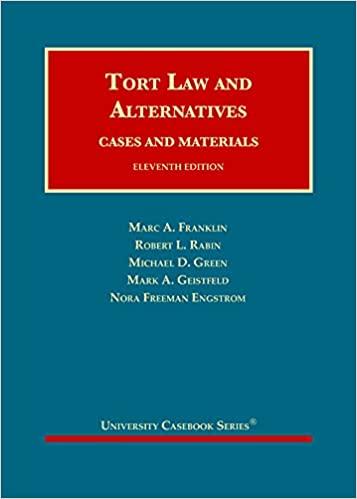Question
1. A vitiating element or factor is one which tends to affect the validity of the contract since it promotes the well-being of a valid
1. A vitiating element or factor is one which tends to affect the validity of the contract since it
promotes the well-being of a valid contract thus acceptable at large. Explain the vitiating
elements.
2. A frustrated contract occurs if an event which brings its further fulfillment to an abrupt end;
and upon the occurrence of the frustrating event the contract is immediately terminated and
the parties discharged. But the doctrine of frustration only relates to the future. List examples
of frustrating events.
3. Breach of contract by a party thereto is also a method of discharge of a contract, because
"Breach" also brings to an end the obligations created by a contract on the part of each of the
parties. Highlight remedies of breach of contract.
4. Goods are items that are being available to the market for either buyer or seller to do business
transaction at the set price. In reference to sale of goods act, highlight the types of goods.
5. A void contract is one that is not acceptable or enforceable by law or does not follow the
guidelines affecting those contracts. Highlight, circumstances under which contract of sale of
goods is void.
6. According to sale of goods act, implied terms are those terms which though not expressly
agreed to by the parties, are an integral part of the contract. Therefore, highlight the
conditions of implied terms by statute.
7. In the sale of goods act, Property in goods passes to the buyer at different times in different
contracts hence the passage of property is governed by various rules or principles. Discuss,
the rules relating to transfer of property.
8. In performance of a contract act, goods are being delivered in different forms either to the
buyer or seller under some specific circumstances. State, the rules of delivery.
9. The nemo dat rule is that the transferor of goods cannot pass a better title than he himself
possesses. In simpler terms one cannot give what he/she does not have. Therefore, state the
exceptions to transfer of title by a non-owner.
10. In the law of sale of goods contract, there are different parties which are assigned some
duties and responsibility. The parties the buyer and the seller and as a result discuss the
duties of seller.
Step by Step Solution
There are 3 Steps involved in it
Step: 1

Get Instant Access to Expert-Tailored Solutions
See step-by-step solutions with expert insights and AI powered tools for academic success
Step: 2

Step: 3

Ace Your Homework with AI
Get the answers you need in no time with our AI-driven, step-by-step assistance
Get Started


